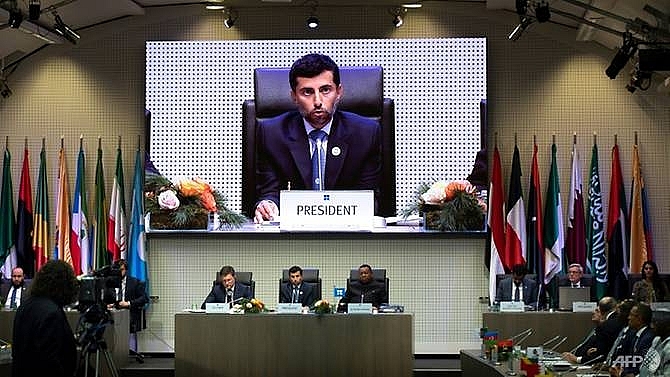Oil producers to review cuts impact in April: UAE
 |
| UAE Energy Minister Suhail al-Mazrouei, seen here addressing the Dec 7 meeting at which OPEC and some non-OPEC producers agreed to cut oil output, says they will meet again in April to review the impact. (Photo: AFP/Joe Klamar) |
OPEC and some non-OPEC producers decided to cut output by 1.2 million barrels per day for six months from January after world prices shed a quarter of their value in just a few weeks.
Prices currently hover around $60 a barrel, down from more than $85 a barrel in early October in the face of fears of weaker demand and an increase in supplies.
"In April, we will have a meeting to review the decision," United Arab Emirates Energy Minister Suhail al-Mazrouei told reporters on the sidelines of a conference in Dubai.
Mazrouei said that national oil company ADNOC has already informed clients that it will cut production by 2.5 percent from January. The UAE, OPEC's fourth largest producer, has been pumping around 3.0 million bpd.
He said that the producers decided to meet in April instead of June "to allow us to take the required decision," before the six months are up.
The minister said the cuts will help restore balance to the world market in 2019.
"We expected there will be a slowdown in demand for oil and accordingly decided to cut production," Mazrouei said.
The producers will also sign a long-term agreement in April to formalise the cooperation between OPEC and non-OPEC parties to the cuts, the minister said.
He said the alliance with Russia and other non-cartel producers has made the Organisation of Petroleum Exporting Countries stronger and more effective.
"OPEC is no longer the 30 million barrel (per day) group ... With OPEC, non-OPEC including Russia, we are now talking about 50 million barrels or half the world's production," Mazrouei said.
What the stars mean:
★ Poor ★ ★ Promising ★★★ Good ★★★★ Very good ★★★★★ Exceptional
 Tag:
Tag:
Related Contents
Latest News
More News
- Russian President congratulates Vietnamese Party leader during phone talks (January 25, 2026 | 09:58)
- Worldwide congratulations underscore confidence in Vietnam’s 14th Party Congress (January 23, 2026 | 09:02)
- Political parties, organisations, int’l friends send congratulations to 14th National Party Congress (January 22, 2026 | 09:33)
- 14th National Party Congress: Japanese media highlight Vietnam’s growth targets (January 21, 2026 | 09:46)
- 14th National Party Congress: Driving force for Vietnam to continue renewal, innovation, breakthroughs (January 21, 2026 | 09:42)
- Vietnam remains spiritual support for progressive forces: Colombian party leader (January 21, 2026 | 08:00)
- Int'l media provides large coverage of 14th National Party Congress's first working day (January 20, 2026 | 09:09)
- Vietnamese firms win top honours at ASEAN Digital Awards (January 16, 2026 | 16:45)
- ASEAN Digital Ministers' Meeting opens in Hanoi (January 15, 2026 | 15:33)
- ASEAN economies move up the global chip value chain (December 09, 2025 | 13:32)






















 Mobile Version
Mobile Version